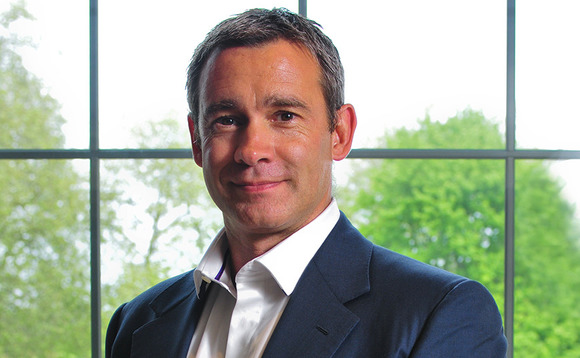
GP Profile: Lion Capital

- Currently raising Lion Capital IV with $2.25bn target
- Over 100 consumer brands acquired to date
- Lyndon Lea and Robert Darwent set up the firm in 2004 together with Neil Richardson
- Offices in London and Los Angeles
Lion Capital founder and managing partner Lyndon Lea talks to Denise Ko Genovese about the genesis of the GP and challenges in the ever-changing retail landscape
Click here to view a complete profile of Lion Capital, including details of funds, LPs and investments on unquote" data
"We all have great elevator pitches about how we add value but the reality is, it's very competitive these days and you are frequently getting beaten in competitive processes," says Lion Capital founding partner Lyndon Lea. "There were loads of generalist funds back when we started and we were one of the first to be sector-focused. But that's not a unique position anymore."
The London-headquartered GP began life in 2004 when Lyndon Lea, Robert Darwent and Neil Richardson set up Lion Capital. The private equity house has since become synonymous with some of the most well-known consumer brands in the market such as Weetabix, Orangina-Schweppes, Jimmy Choo, Wagamama, Kettle Foods and AllSaints, having invested in around 30 businesses incorporating more than 100 consumer brands.

Lion is currently raising its fourth fund – Lion Capital 2015 – from which it has already made two investments: protein bar maker Grenade in March this year and casual dining and bar chain Loungers in December 2016. The target is thought to be in the $2.25bn region with a first close already touted in the $1bn range last December.
Previous funds include Lion Capital Fund I, which closed on €820m in 2004; Lion Capital Fund II, which closed on €2bn in 2007; and Lion Capital Fund III, which closed on €1.5bn in 2010. They are all fully deployed.
Less is more
With the proliferation of funds, buoyancy of markets and increasingly liquid debt markets, competition has spiked for everyone in recent years, says Lea. But while some big private equity firms are getting bigger and diversifying into other areas, Lion is determined to stay on the same path.
"I think we will extrapolate our original thesis – focus on less – but take it even further than we have in the past," says Lea, adding that there is no temptation to become more generalist. "Perhaps we'll focus our capital on doing fewer investments with more conviction. It is difficult to find 11-12 deals to put in a fund these days."

Lea admits that it is hard to know where Lion or the private equity world in general will evolve to next, let alone retail and consumer trends.
"The retail environment terrifies me. Everyone is talking about experience versus product and what the millennial customer wants, but I don't think it is quite as simple as that. We have to understand what experience is being sought and why. Things are in a state of flux and it is difficult to know what the vision of retail will be like in 5-10 years' time."
But Lion is clearly undeterred by the ever-changing consumer landscape. Perhaps because the team has made a success of it for so long.
"There are brands and there are brands," says Lea. "The moment of truth comes when you go to a shop and Weetabix – or the product you are seeking – isn't on the shelf. What do you do?" he asks. "Very few products pass this test. Orangina and Coca-Cola do because you don't settle for a substitute product."
You know when it is time to call it a day when the incremental capital needed doesn't offer the rates of return you need. We have the scars on our back. We have made mistakes" – Lyndon Lea, Lion Capital
Presumably it was that brand test that caught Lion's eye when first investing in Weetabix in 2004.
"It was third-generation family-owned and we had a very candid conversation with Richard George who was running the show at the time. He said he wasn't the guy to take it to the next level, so we changed all the management team apart from the CFO."
Despite already being a household name and deeply embedded into the UK consumer psyche, the GP's introduction of new products alone increased turnover by £250m, with EBITDA growing to £128m just before its 60% partial exit in 2012, up from £67m on entry in 2005.
It is not just profit-making businesses with a need to diversify that Lion is attracted to. Contemporary fashion brand AllSaints was 24 hours away from administration when the GP struck a deal in 2011. Lion acquired the business together with US partner Goode for £105m and sales are now £350m a year compared to £200m, with the company turning a profit of £28m.
"In this case it was about educating the customer that they couldn't always buy on discount. But everyone wants value, even in luxury."
Calling it a day
Even the consumer specialist whose other successes include hair styling products group GHD and noodle chain Wagamama are not immune to errors, with the group very candid about the letting go of investments such as lingerie business La Senza, frozen food group Findus and personal care company Personna.
"You know when it is time to call it a day when the incremental capital needed doesn't offer the rates of return you need," says Lea. "We have the scars on our back. We have made mistakes." But what does resonate with founders of companies is that Lion has been doing this for a long time, Lea says.
"We have a great knack of taking businesses from the $50-100m bracket to the $200m-plus bracket. But they are getting harder to find," he admits.
"Before you could buy a business and within two to three years make a return. That has changed and now the depth and scale of change needs to be greater. The market is heading towards longer holding periods for investments," he says, adding that almost all of Lion's 2010 investments are still under its ownership.
"Previously, a typical holding time was three to fours years before exiting, but now it seems the market is heading towards six-plus. Perhaps the traditional 10-year fund model needs a rethink."
Key People
• Lyndon Lea, founder and managing partner, was previously a partner of Hicks Muse Tate & Furst where he co-founded its European operations in 1998. Prior to this, he was at Glenisla, the European affiliate of KKR.
• Robert Darwent, partner, was previously at Hicks Muse Tate & Fust and also in the private equity group of Morgan Stanley in London.
• Javier Ferran, partner, was previously at the Bacardi Group for 20 years, which included the role of president and CEO of Bacardi.
Latest News
Stonehage Fleming raises USD 130m for largest fund to date, eyes 2024 programme
Multi-family office has seen strong appetite, with investor base growing since 2016 to more than 90 family offices, Meiping Yap told Unquote
Permira to take Ergomed private for GBP 703m
Sponsor deploys Permira VIII to ride new wave of take-privates; Blackstone commits GBP 200m in financing for UK-based CRO
Partners Group to release IMs for Civica sale in mid-September
Sponsor acquired the public software group in July 2017 via the same-year vintage Partners Group Global Value 2017
Change of mind: Sponsors take to de-listing their own assets
EQT and Cinven seen as bellweather for funds to reassess options for listed assets trading underwater








